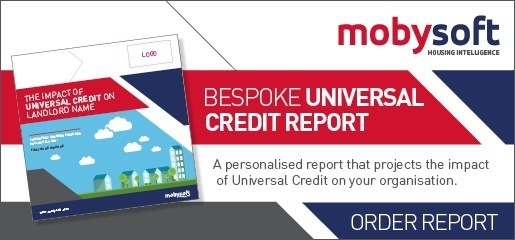So, because of Universal Credit, the environment has changed dramatically, and many landlords are looking to different ways to try and stem the tide and mitigate its effects. Gail talked about how Highland had taken on additional housing staff, however, another landlord we spoke to at the Scottish Housing Festival explained how their current systems were simply not able to tell which UC tenants were in arrears and which were not, which simply exacerbated the workload of their already busy housing officers.
With RSLs struggling to manage workload and the negative effect existing systems are having on staff, is it time to try something else?
In recent months several RSLs (including DGHP, Thenue Housing, Loreburn, Eildon, Waverley Housing, Queens Cross, East Dunbartonshire Council) have invested in predictive analytics to try and work differently and free up their officers’ time so they can manage their workload more effectively. They join full service UC pilot sites in England, such as Southwark Council, Your Homes Newcastle, Sutton Housing Partnership and Oxford City Council.
Keen to try something different, Gregor Booth, Operations Director at Waverley Housing explains why they are trialling a predictive analytics solution:
“We wanted to plan for this (full-service roll out) in order to ensure our housing teams can work as effectively as possible in dealing with the forecast impact. We are aware of research that indicates the negative effects of the roll out on average arrears levels and the increasing amounts of staff time spent on dealing with Universal Credit cases.”
“We have signed up to a twelve months contract (for the predictive analytics solution) to see if it works for us, which gives us time to evaluate the system and keeps our investment to a minimum.”
Fail Fast & Quick Wins
So, when existing ways of working are not proving successful, is time to try something new? Wedded to this approach is a relatively new ideology about failing fast, which essentially focuses on trying to measure different approaches and seeing which work and which don’t. Technology today is an easy tool to test this methodology. The latest tools, tend to be cloud-based so this means short implementation times, very little internal IT resource required and also short contracts, meaning solutions can be experimented with to deliver quick wins or if does it not work the ability to move on and limit any investment.“It helps that the software can be installed and operational within 3-months, so we should start seeing the benefits and a positive impact on performance quickly,” explains Louise Smith, Director of Neighbourhood Services at Queens Cross Housing.
“As Universal Credit will go to full service in October we wanted to get the software up and running to put us in a stronger position to deal with the impact of full UC implementation.”
Is it a quick fix?
Whatever landlords do they need to look at new innovative ways of mitigating risk and protecting their revenues from Universal Credit. But, is technology a sticking plaster over a bigger problem or can it really deliver an immediate solution to a complex problem?
“By deploying predictive analytical software, we experienced a workload reduction for our front line officers from day one, and it is really easy to use, the team love it,” comments Amanda Yellowley, Operations Director at Loreburn Housing.For Dumfries and Galloway Housing Partnership (DGHP) the income officers ‘are looking forward to exploiting the technology’s potential moving forward,’ according to Iain Thomson, the Income Manager at the Dumfries based landlord.
Technology is part of the solution, but importantly it is measurable and can be trialled and tested. There is a fundamental shift required in culture across the board, which UC is supposed to engender, that needs embracing, that this is the new norm. Whatever happens the Government is not going to back track or back down on this. Yes, the administration needs improving along with DWP systems, but UC is here to stay and means landlords are operating in a different environment that requires different tools.
Find out the potential impact of Universal Credit on your organisation by creating your own personalised report that projects how UC will effect revenues, collection, staffing levels and much more.
What do you think?
We would like to hear what you think about Universal Credit and the impact it is having on your organisation. Please do leave a comment below and let us know how wider welfare reform is effecting your RSL.

